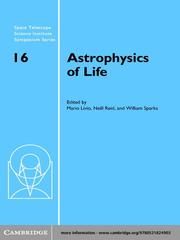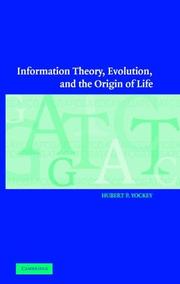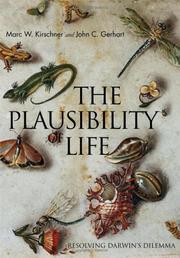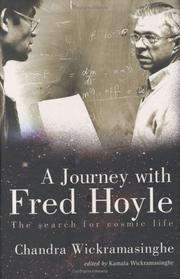| Listing 1 - 7 of 7 |
Sort by
|

ISBN: 9780511536113 9780521824903 9780521173285 0511080786 9780511080784 0511079265 9780511079269 0511080026 9780511080029 0521824907 0521173280 0511536119 0521824907 1107137527 128043676X 9786610436767 051117084X 0511196369 051129798X Year: 2005 Publisher: Cambridge New York Cambridge University Press
Abstract | Keywords | Export | Availability | Bookmark
 Loading...
Loading...Choose an application
- Reference Manager
- EndNote
- RefWorks (Direct export to RefWorks)
Astrobiology is one of the hottest areas of current research, reflecting not only impressive advances in the understanding of the origin of life but also the discovery of over 100 extrasolar planets in recent years. This volume is based on a meeting held in 2002 at the Space Telescope Science Institute, which aimed to lay the astrophysical groundwork for locating habitable places in the Universe. Written by leading scientists in the field, it covers a range of topics relevant to the search for life in the Universe, including: cosmology and its implications for the emergence of life, the habitable zone in the Milky Way Galaxy, the formation of stars and planets, the study of interstellar and interplanetary matter, searches for extrasolar planets, the synthesis of organic material in space, and spectroscopic signatures that could be used to detect life. This is an invaluable resource for both professional researchers and graduate students.
Exobiology --- Life on other planets --- Life --- Abiogenesis --- Biogenesis --- Germ theory --- Heterogenesis --- Life, Origin of --- Life (Biology) --- Origin of life --- Plasmogeny --- Plasmogony --- Evolution (Biology) --- Spontaneous generation --- Origin. --- Origin --- Astrophysics of life
Book
ISBN: 3938616075 Year: 2005 Publisher: Göttingen : Universitätsverlag,
Abstract | Keywords | Export | Availability | Bookmark
 Loading...
Loading...Choose an application
- Reference Manager
- EndNote
- RefWorks (Direct export to RefWorks)
Our planet earth is a system - scarcely understood - of geological, biological und cosmic processes of great variety, which make it an interesting object of research. The papers listed here deal with topics of a series of lectures open to the public, presented at the Academy of Sciences and at the Georg August University of Göttingen, which were organised by the publishers of this book. It is the publishers' aim to bring before the public a few important and interesting geoscientific aspects. Needless to say, there is no claim to cover all aspects of this subject area. However, the publishers would like to initiate readers to concentrate more deeply on scientific topics. The selected material should help them to find their way through the diversity of this branch of research. Der Planet Erde ist ein nur wenig verstandenes System von geologischen, biologischen und kosmischen Prozessen und somit ein interessantes und vielseitiges Forschungsobjekt. Die hier vorgestellten Beiträge waren Teil einer öffentlichen Ringvorlesung der Akademie der Wissenschaften zu Göttingen und der Georg-August-Universität Göttingen im WS 2002/2003, organisiert von den Herausgebern dieses Buches. Den Herausgebern ist es ein Anliegen, einige wichtige und interessante Aspekte der Geowissenschaften einer breiteren Öffentlichkeit zu vermitteln. Es besteht nicht der Anspruch auf Vollständigkeit dieses Themenkomplexes. Die Herausgeber wollen jedoch Anstöße geben, sich intensiver mit dem Themenfeld Geowissenschaften zu beschäftigen. Die ausgewählten Beiträge sollen dem Leser helfen, sich in der Vielfalt der Facetten dieses Forschungsbereiches zurechtzufinden.
Geology. --- Paleontology. --- Life --- Abiogenesis --- Biogenesis --- Germ theory --- Heterogenesis --- Life, Origin of --- Life (Biology) --- Origin of life --- Plasmogeny --- Plasmogony --- Evolution (Biology) --- Exobiology --- Spontaneous generation --- Fossilogy --- Fossilology --- Palaeontology --- Paleontology, Zoological --- Paleozoology --- Historical geology --- Zoology --- Fossils --- Prehistoric animals in motion pictures --- Geognosy --- Geoscience --- Earth sciences --- Natural history --- Origin. --- Origin --- Geology --- Paleontology --- RBINS-SYMPOSIUM --- Conferences - Meetings

ISBN: 9780521169585 9780511546433 9780521802932 0511115377 9780511115370 0511546432 0521802938 1280415142 9781280415142 0521169585 1107143861 9786610415144 0511198825 0511181795 0511322739 0511114826 Year: 2005 Publisher: Cambridge New York Cambridge University Press
Abstract | Keywords | Export | Availability | Bookmark
 Loading...
Loading...Choose an application
- Reference Manager
- EndNote
- RefWorks (Direct export to RefWorks)
Originally published in 2005, Information Theory, Evolution and the Origin of Life presents an introduction to the use of information theory and coding theory in molecular biology. The genetical information system, because it is linear and digital, resembles the algorithmic language of computers. George Gamow pointed out that the application of Shannon's information theory breaks genetics and molecular biology out of the descriptive mode into the quantitative mode and Dr Yockey develops this theme, discussing how information theory and coding theory can be applied to molecular biology. He discusses how these tools for measuring the information in the sequences of the genome and the proteome are essential for our complete understanding of the nature and origin of life. The author writes for the computer competent reader who is interested in evolution and the origins of life.
Molecular biology. --- Information theory in biology. --- Evolution (Biology) --- Life --- Abiogenesis --- Biogenesis --- Germ theory --- Heterogenesis --- Life, Origin of --- Life (Biology) --- Origin of life --- Plasmogeny --- Plasmogony --- Exobiology --- Spontaneous generation --- Animal evolution --- Animals --- Biological evolution --- Darwinism --- Evolutionary biology --- Evolutionary science --- Origin of species --- Biology --- Evolution --- Biological fitness --- Homoplasy --- Natural selection --- Phylogeny --- Biomathematics --- Molecular biochemistry --- Molecular biophysics --- Biochemistry --- Biophysics --- Biomolecules --- Systems biology --- Origin. --- Origin

ISBN: 1281721832 9786611721831 0300128673 9780300128673 0300108656 9780300108651 9781281721839 0300119771 9780300119770 6611721835 Year: 2005 Publisher: New Haven Yale University Press
Abstract | Keywords | Export | Availability | Bookmark
 Loading...
Loading...Choose an application
- Reference Manager
- EndNote
- RefWorks (Direct export to RefWorks)
In the 150 years since Darwin, the field of evolutionary biology has left a glaring gap in understanding how animals developed their astounding variety and complexity. The standard answer has been that small genetic mutations accumulate over time to produce wondrous innovations such as eyes and wings. Drawing on cutting-edge research across the spectrum of modern biology, Marc Kirschner and John Gerhart demonstrate how this stock answer is woefully inadequate. Rather they offer an original solution to the longstanding puzzle of how small random genetic change can be converted into complex, useful innovations.In a new theory they call "facilitated variation," Kirschner and Gerhart elevate the individual organism from a passive target of natural selection to a central player in the 3-billion-year history of evolution. In clear, accessible language, the authors invite every reader to contemplate daring new ideas about evolution. By closing the major gap in Darwin's theory Kirschner and Gerhart also provide a timely scientific rebuttal to modern critics of evolution who champion "intelligent design."
Evolution (Biology) --- Life --- Abiogenesis --- Biogenesis --- Germ theory --- Heterogenesis --- Life, Origin of --- Life (Biology) --- Origin of life --- Plasmogeny --- Plasmogony --- Exobiology --- Spontaneous generation --- Animal evolution --- Animals --- Biological evolution --- Darwinism --- Evolutionary biology --- Evolutionary science --- Origin of species --- Biology --- Evolution --- Biological fitness --- Homoplasy --- Natural selection --- Phylogeny --- Origin. --- Origin --- Philosophy of nature
Book
ISBN: 0511130511 9780511130519 1280223642 9781280223648 1107151481 9786610223640 0511199783 0511130155 0511300328 051161473X 0511128983 Year: 2005 Publisher: New York Cambridge University Press
Abstract | Keywords | Export | Availability | Bookmark
 Loading...
Loading...Choose an application
- Reference Manager
- EndNote
- RefWorks (Direct export to RefWorks)
Erwin Schrödinger's What is Life? published 60 years ago, influenced much of the development of molecular biology. In this new book Christian De Duve, Nobel Laureate and pioneer of modern cell biology, presents a contemporary response to this classic, providing a sophisticated consideration of the key steps or bottlenecks that constrain the origins and evolution of life. De Duve surveys the entire history of life, including insights into the conditions that may have led to its emergence. He uses as landmarks the many remarkable singularities along the way, such as the single ancestry of all living beings, the universal genetic code, and the monophyletic origin of eukaryotes. The book offers a brief guided tour of biochemistry and phylogeny, from the basic molecular building blocks to the origin of humans. Each successive singularity is introduced in a sequence paralleling the hypothetical development of features and conditions on the primitive earth, explaining how and why each transition to greater complexity occurred.
Life --- Evolution (Biology) --- Singularities (Mathematics) --- Geometry, Algebraic --- Animal evolution --- Animals --- Biological evolution --- Darwinism --- Evolutionary biology --- Evolutionary science --- Origin of species --- Biology --- Evolution --- Biological fitness --- Homoplasy --- Natural selection --- Phylogeny --- Abiogenesis --- Biogenesis --- Germ theory --- Heterogenesis --- Life, Origin of --- Life (Biology) --- Origin of life --- Plasmogeny --- Plasmogony --- Exobiology --- Spontaneous generation --- Origin. --- Origin
Book
ISBN: 2738116213 9782738116215 Year: 2005 Publisher: Paris O. Jacob
Abstract | Keywords | Export | Availability | Bookmark
 Loading...
Loading...Choose an application
- Reference Manager
- EndNote
- RefWorks (Direct export to RefWorks)
Quelle est l'origine de la vie ? Terrestre ou extraterrestre ? Et sur Terre, d'origine maritime ou volcanique ? Quelle est la chaîne des événements chimico-biologiques qui ont conduit à la vie ? Propose un modèle d'explication de l'origine de la vie, le modèle du multimère, qui n'est pas exclusif des autres modèles imaginés. Explique cette origine comme une succession de hasards et de nécessités. [Source : Electre]
Life --- Origin --- Evolution (Biology) --- Singularities (Mathematics) --- Biological Evolution --- Evolution, Biological --- Sociobiology --- Geometry, Algebraic --- Animal evolution --- Animals --- Biological evolution --- Darwinism --- Evolutionary biology --- Evolutionary science --- Origin of species --- Biology --- Evolution --- Biological fitness --- Homoplasy --- Natural selection --- Phylogeny --- Abiogenesis --- Biogenesis --- Germ theory --- Heterogenesis --- Life, Origin of --- Life (Biology) --- Origin of life --- Plasmogeny --- Plasmogony --- Exobiology --- Spontaneous generation

ISBN: 1281877174 9786611877170 9812565795 9789812565792 9789812389114 9812389113 9789812389121 9812389121 9781281877178 Year: 2005 Publisher: Hackensack, N.J. World Scientific
Abstract | Keywords | Export | Availability | Bookmark
 Loading...
Loading...Choose an application
- Reference Manager
- EndNote
- RefWorks (Direct export to RefWorks)
This is the story of the author's unique scientific journey with oneof the most remarkable men of 20th century science. The journey beginsin Sri Lanka, the author's native country, with his childhoodacquaintance with Fred Hoyle's writings. The action then moves toCambridge, where the famous Hoyle-Wickramasinghe collaborationsbegin.
Astronomers --- Life --- Cosmic dust. --- Dust --- Interstellar matter --- Abiogenesis --- Biogenesis --- Germ theory --- Heterogenesis --- Life, Origin of --- Life (Biology) --- Origin of life --- Plasmogeny --- Plasmogony --- Evolution (Biology) --- Exobiology --- Spontaneous generation --- Origin. --- Origin --- Wickramasinghe, N. C. --- Hoyle, Fred, --- Hoyle, F. --- Khoĭl, Fred, --- Hūyl, Firid, --- هويل، فرد --- Wickramasinghe, Nalin Chandra, --- Cosmic dust --- Wickramasinghe, Chandra --- Astronomers - Biography --- Life - Origin --- Acqui 2006 --- Wickramasinghe, N. C. - (Nalin Chandra), - 1939 --- -Hoyle, Fred, - Sir --- Wickramasinghe, Chandra,
| Listing 1 - 7 of 7 |
Sort by
|

 Search
Search Feedback
Feedback About UniCat
About UniCat  Help
Help News
News